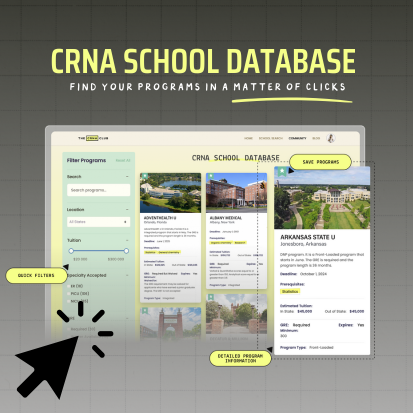“If you fail to prepare, you plan to fail.” This saying is most accurate in graduate school. Preparing a plan will save you a headache and potentially lower financial stress during the program. This blog post will discuss building a budget plan that can be individualized to your needs. Then, we will tackle a couple of unexpected expenses you may encounter.
Budgeting Is Crucial for CRNA School
Building a Realistic Graduate School Budget
This is a crucial step. Knowing how much you spend every month is helpful to make a realistic budget that you can stick to.
Tracking Fixed and Variable Expenses
Tracking means knowing what expenses fall into two categories: fixed or variable.
- Fixed expenses remain constant each month, like rent or loan payments.
- Variable expenses, like groceries or entertainment, fluctuate based on your consumption or behavior.
You can adjust the categories to fit your specific situation better. This chart can be used to track and categorize your spending.
| Expense Category | Fixed Expenses | Variable Expenses |
|---|---|---|
| Housing | Rent/Mortgage $______ | Repairs/Maintenance $______ |
| Utilities | Utilities | Varies with usage (e.g., heating in winter) $______ |
| Transportation | Car payment, insurance $______ | Gasoline, Public Transit, Maintenance $______ |
| Food | Groceries, Dinning Out $______ | |
| Insurance | Health, Life, Auto $______ | |
| Debt Payments | Loan Payments, Credit Card Minimums $______ | Extra Debt Payments $______ |
| Savings/Investments | Retirement Contributions (e.g., 401K) $______ | Additional Savings Contributions $______ |
| Entertainment | Streaming Subscriptions $______ | Movies, Concerts, Hobbies $______ |
| Personal Care | Haircuts, Cosmetics, Gym Memberships $______ | |
| Healthcare | Medications, Doctor Visits $______ | |
| Miscellaneous | Childcare $______ | Gifts, Donations $______ |
Creating a Personalized Budget Plan
Creating a sample budget with the information you’ve learned involves applying your categorized expenses and income to develop a realistic monthly financial plan. Here’s a step-by-step guide:
- List Your Income
– Start by listing all sources of income. Include your salary, side gigs, freelance work, investments, etc. - List Your Fixed Expenses
– Identify all your fixed expenses, which are the same every month. - List Your Variable Expenses
– Identify all your variable expenses, which can change monthly. - Allocate Money to Savings/Investments
– Decide how much to allocate towards savings or investments based on your financial goals. - Calculate the Total Expenses
– Add up your fixed, variable, and savings to determine your monthly expenses. - Compare Income to Expenses
– Subtract your total expenses from your total income to see if you have a surplus or deficit. - Create the Budget Layout
Adjusting Your Budget for Financial Success
By following this process, you can create a practical and personalized budget that helps you manage your finances effectively.
- Adjust as Needed
- If you have a surplus, decide where to allocate the extra funds (e.g., more savings, debt repayment, or a larger emergency fund).
- If you have a deficit, look for areas to cut back on variable expenses or adjust your savings plan.
- Review and Adjust Regularly
- Revisit your budget monthly to ensure it aligns with your income and spending patterns. Adjust as needed for changes in income or expenses.

Preparing for Miscellaneous and Hidden Expenses
These are expenses that might pop up during CRNA school, which may not have been part of your initial budgeting plans.
- Licensing and Certification Fees
– Exam Fees: Costs for the NBCRNA (National Board of Certification and Recertification for Nurse Anesthetists) exams, including any practice exams.
– Licensing Fees: State-specific fees for obtaining or maintaining your nursing license.
– Certification Renewal: Costs associated with renewing your certifications during the program. - Books and Study Materials
– Textbooks: Additional or updated textbooks you might need as courses progress.
– Supplementary Study Guides: Resources such as review books, flashcards, or online subscriptions for study aids.
– Online Databases and Journals: Access fees for specialized medical journals or research databases. - Clinical Supplies
– Uniforms and Scrubs: Extra sets of scrubs, lab coats, or uniforms specific to clinical rotations.
– Equipment: Stethoscopes, pens, notebooks, or other clinical tools you may need.
– Safety Gear: safety goggles or other protective equipment that are required during clinical placements. - Travel and Accommodation
– Clinical Rotations: Travel expenses for rotations outside your local area, including gas, parking, or public transportation.
– Accommodation: Temporary housing or hotels if rotations are far from home.
– Conferences and Workshops: Travel and lodging expenses for attending anesthesia-related conferences, workshops, or continuing education events. - Technology Needs
– Computer/Tablet Upgrades: If your current devices aren’t sufficient for the program’s demands, you might need to upgrade.
– Software Subscriptions: Programs like drug calculation software, medical reference apps, or cloud storage services for your work.
– Internet Costs: Potential need for higher-speed internet or additional data for remote learning or research. - Health and Wellness
– Mental Health Services: Counseling or therapy services to manage stress during the rigorous program.
– Fitness and Well-being: Gym memberships, yoga classes, or other wellness activities to help manage the physical and mental demands of the program. - Professional Networking and Memberships
– Professional Associations: Membership fees for organizations like the AANA (American Association of Nurse Anesthetists) or state-specific groups. - Graduation Costs
– Graduation Fees: Costs related to graduation ceremonies, such as cap and gown rentals.
– Commencement Photos: Professional photos or other memorabilia from graduation.
– Board Prep Courses: Additional expenses for board examination preparation courses that may be required toward the end of the program. - Miscellaneous School Fees
– Lab Fees: Additional fees for using laboratory facilities or specialized equipment.
– Printing and Copying: Costs of printing materials, assignments, or research papers.
– Parking: On-campus parking fees that you might not have initially considered. - Unexpected Life Events
– Emergency Funds: It’s always good to set aside a little extra for unexpected personal expenses, such as car repairs or medical emergencies.
Conclusion: Financial Planning for a Successful CRNA Journey
CRNA school is a significant investment in your future, and being financially prepared is vital to reducing stress and staying focused on your studies. By accounting for these unexpected expenses in your budget, you’ll be better equipped to handle whatever comes your way during this rigorous program.
Check Out Our CRNA Resources
Looking for tools to support your CRNA school journey? Visit our Shop for affordable resources, including a CRNA School Database, Resume Templates, and On-Demand Mock Interviews. Check them out here.
Want to learn more about preparing financially for CRNA school? We’ve got lessons and resources for you inside The CRNA Club Membership!







